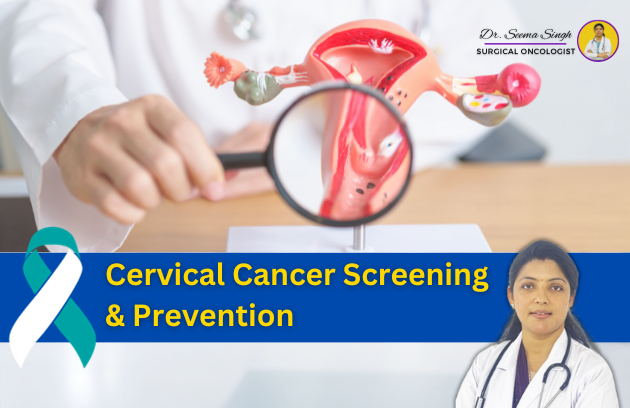- November 29, 2023
- Dr Seema Singh
- Comment: 0
- Uncategorized
Cervical cancer is a type of cancer that affects a part of a woman’s body called the cervix. But the good news is, there are ways to catch it early and even prevent it. One important tool in this fight is something called cervical cancer screening.
What is Cervical Cancer Screening?
Cervical cancer screening is like a health check for your cervix. It helps find any early signs of a problem before you even feel sick. The goal is to catch anything unusual early so that it can be treated before it becomes a bigger issue.
There are a few ways doctors do this screening:
Pap Test (or Pap Smear):
It’s like a quick checkup for your cervix. The doctor takes a tiny sample of cells from your cervix, and they check these cells under a microscope to make sure everything looks normal.
HPV Test:
This one checks for a virus called HPV (human papillomavirus). Some types of HPV can lead to cervical cancer. The test looks for these viruses in the cells taken during a Pap test.
Visual Inspection:
In some places, doctors use a simple test where they apply a solution on the cervix. If there’s something unusual, it shows up, helping the doctor catch any problems.
How to Prevent Cervical Cancer
But wait, there’s more good news! There are things you can do to lower your chances of getting cervical cancer in the first place:
Get Vaccinated: There’s a vaccine called Gardasil that helps your body fight the virus that can lead to cervical cancer. It’s usually given to teenagers, but it can help at any age up to 45.
Safe Habits: Be smart about your choices. Delay having sex until you’re a bit older, limit the number of partners you have, and use protection like condoms.
No Smoking: If you smoke, consider quitting. Smoking can increase your risk of cervical cancer, and quitting is a step towards a healthier you.
Regular Checkups: Don’t skip your regular checkups with your doctor. They can catch any issues early, and you can discuss whether you need cervical cancer screening.
When and How Often?
The timing of screening can vary, but generally, it starts around the age of 21. How often depends on factors like your age, health history, and other factors. Your doctor will guide you on the best plan for you.
Conclusion
Cervical cancer screening is like giving your cervix a superhero shield. It’s a way to catch problems early and even prevent them. With the right steps, you can take control of your health and lower the risk of cervical cancer. So, don’t forget to talk to your doctor about what’s right for you. It’s a small step that can make a big difference in your well-being. Stay healthy!


